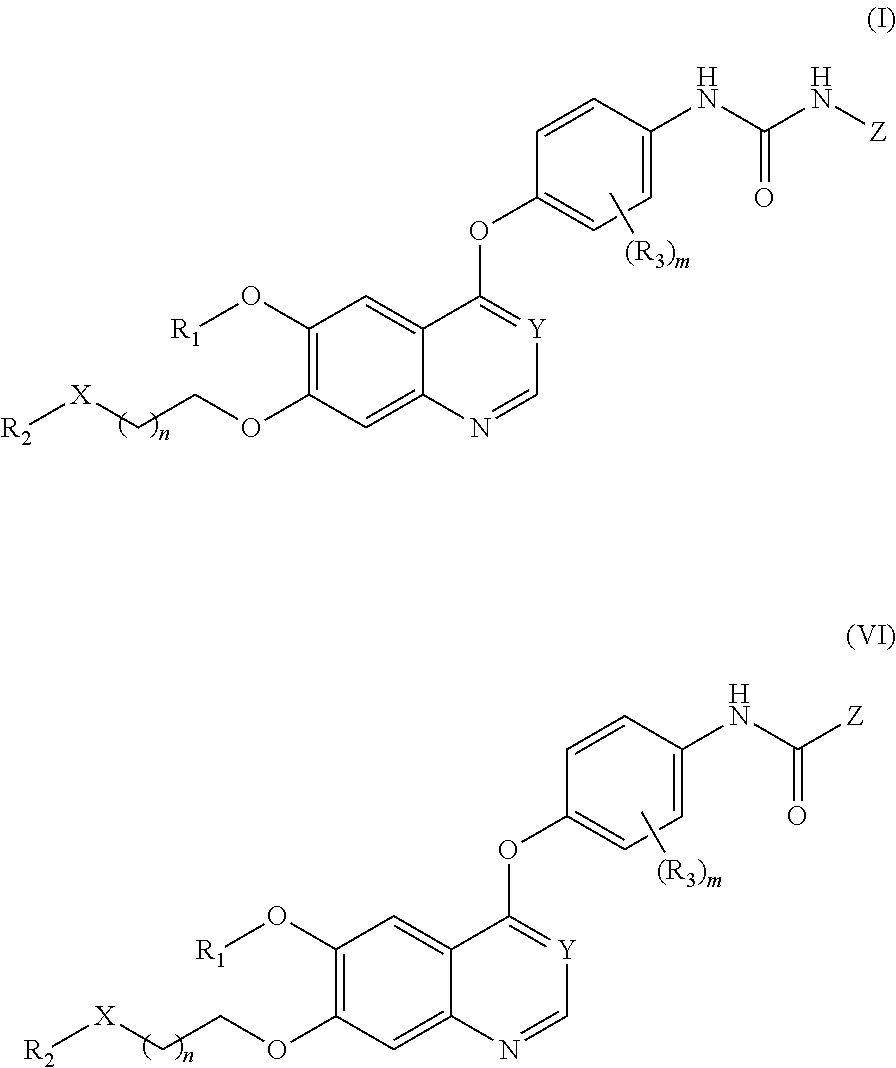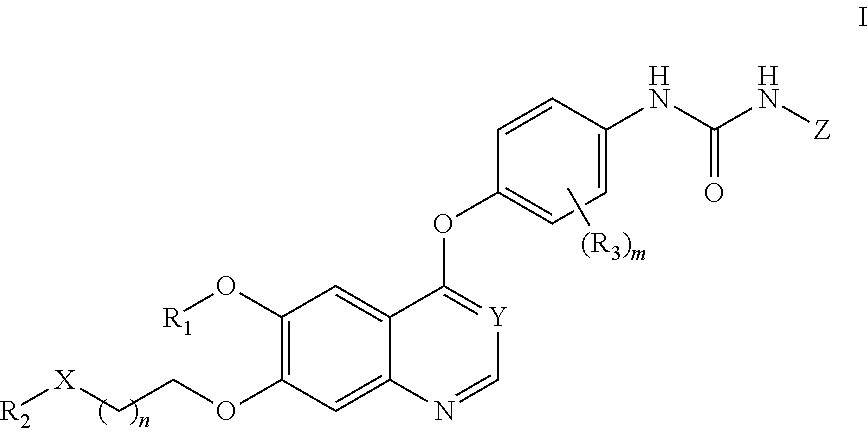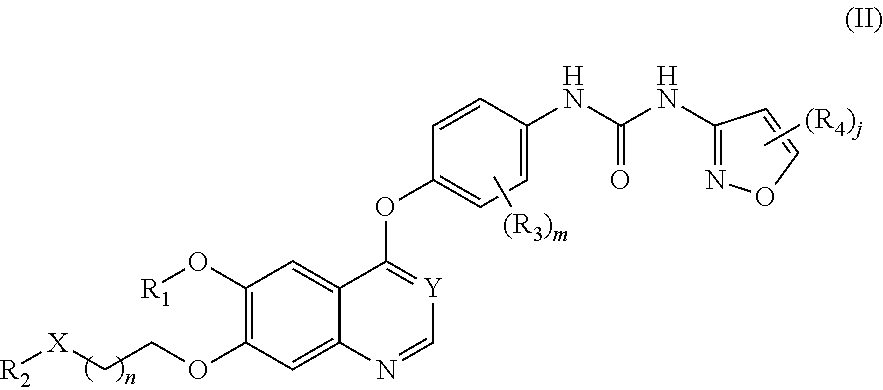Therapeutic compounds and uses thereof
a technology of proliferative diseases and therapeutic compounds, applied in the field of therapeutic compounds and methods of treating proliferative diseases and diseases associated with anagiogenesis, can solve the problems of irreversible vision loss in developed countries, achieve effective delivery of the intended therapeutic effect, avoid mucus clearance mechanisms, and quickly eliminate effects
- Summary
- Abstract
- Description
- Claims
- Application Information
AI Technical Summary
Benefits of technology
Problems solved by technology
Method used
Image
Examples
example 1
Synthesis of Compounds under Scheme 1
Compound 100
[0470]Free phenol (1 equiv) and potassium carbonate (5 equiv) were suspended in N,N-dimethylformamide. Benzyl bromide (1.1 equiv) was added dropwise and the reaction stirred at 45° C. for 2 hours. The solvent was evaporated and the remaining crust suspended in H2O. The slurry was sonicated and the solid filtered. Filter cake was washed with H2O and hexane, then dried under high vacuum. 100 was isolated as light brown solid, yield=1.7 g (95%), m / z 300 (M+H)+.
Compounds 26 & 101
[0471]4-Amino-3-chlorophenol hydrochloride (1.1 to 1.5 equiv) was suspended in N,N-dimethylfomamide. The suspension was purged with nitrogen and sodium hydride (2 equiv, 60% suspension in oil) was added followed by potassium carbonate (2 equiv). 100 (1 equiv) was added and the suspension was purged with nitrogen again. The suspension was heated for 2 hours at 100° C. in an oil bath. The solvent was evaporated. The residue was treated with water and sonicated. The ...
example 2
Preparation of Compound 106
[0477]
Compound 110
[0478]A mixture of 109 (100.0 g, 601.68 mmol), benzyl bromide (79.0 mL, 649.81 mmol) and potassium carbonate (249.0 g, 1.8 mol) in N,N-dimethylformamide (2000 mL) was heated to 40° C. overnight. The solution was cooled to room temperature, poured into ice water (1500 mL) and stirred for 1 h. The resultant solid was filtered and washed by H2O (2×500 mL), dried to give 110 (148.8 g, yield=96.5%) as a white solid.
Compound 111
[0479]HNO3 (60.9 mL) was added dropwise to a solution of 110 (148.8 g, 580.57 mmol) in dichloromethane (2500 mL) at 0° C. The reaction mixture was stirred for 20 min at 0° C. H2SO4 (47.2 mL) was added and the mixture was stirred for another 45 min. Additional HNO3 (41.5 mL) was added dropwise over 20 min. The reaction mixture was poured into ice water (1500 mL) and stirred for 30 min. The organic phase was separated and washed with water (4×1000 mL) and saturated NaHCO3 (800 mL), dried over Na2SO4, and concentrated in va...
example 3
Preparation of Compound 9
[0488]
Compound 1
[0489]To a solution of methyl vanillate (150 g, 0.82 mol) in dry N,N-dimethylformamide (DMF) (1200 mL) was added 1-bromo-3-chloropropane (259.6 g, 1.65 mol) and K2CO3 (341 g, 2.47 mol). The mixture was stirred at 50° C. overnight. The reaction mixture was poured into water (300 mL) filtered, the solid was washed with water (500 mL) then hexane (250 mL), and dried to give 209 g (yield=97.9%) of 1 as a white solid.
[0490]
Compound 2
[0491]1 (160 g, 0.62 mol) was taken in acetic acid (1100 mL) and acetic anhydride (90 mL) was added. The solution was cooled to 0° C. and nitric acid (90 mL) was added. The reaction mixture was stirred for 10 minutes at room temperature, then heated to 50° C. for 5 h. The reaction mixture was cooled and was diluted with ethyl acetate (5000 mL). The ethyl acetate layer was washed with aq. NaHCO3 (2000 mL) and concentrated to afford 180 g (yield=95.8%) of 2 as a yellow solid.
[0492]
Compound 3
[0493]To a solution of 2 (170 ...
PUM
| Property | Measurement | Unit |
|---|---|---|
| diameter | aaaaa | aaaaa |
| diameter | aaaaa | aaaaa |
| intraocular pressure | aaaaa | aaaaa |
Abstract
Description
Claims
Application Information
 Login to View More
Login to View More - R&D
- Intellectual Property
- Life Sciences
- Materials
- Tech Scout
- Unparalleled Data Quality
- Higher Quality Content
- 60% Fewer Hallucinations
Browse by: Latest US Patents, China's latest patents, Technical Efficacy Thesaurus, Application Domain, Technology Topic, Popular Technical Reports.
© 2025 PatSnap. All rights reserved.Legal|Privacy policy|Modern Slavery Act Transparency Statement|Sitemap|About US| Contact US: help@patsnap.com



